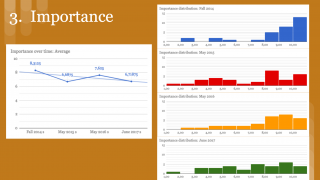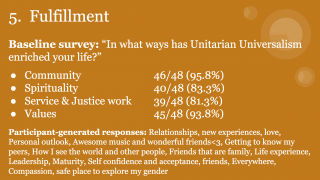Why Do Engaged UU Youth Become Untethered Young Adults?
By Emily Parker
Why do so many UU youth lose connection with UU communities as they move into young adulthood? Are we failing our youth? Or are we preparing them for their “free and responsible search for truth and meaning”?
Inspired by these questions, I created the Post-Bridging Survey Project to study how my peers and I bridge from youth to young adulthood in the UU faith. My in-depth surveys of 32 emerging adults over four years are uncovering how our relationships with Unitarian Universalism change in the first years following bridging.
See graphs & fast facts about survey results.
When we bridge, engaged UU youth become drastically less engaged UU young adults. This drop-off in engagement is so dramatic in the first year, it is actually cliff-like. Survey respondents who dedicate more than one hour/week to UU activities drop from 78% of youth to 31% of first-year young adults. As youth, 41% rate the importance of UU in their lives 10/10, and 44% are certain they will stay involved for the rest of their lives. One year later, those figures have dropped to 19% and 28% respectively.
However, the landscape evens after the first-year drop. My data points to continued disengagement, but at a slower rate. In fact, the lowest UU participation and valuation was reported in the first year after bridging, not in the most recent survey. The first year after bridging appears to be a critical time worthy of our attention.
Only two participants’ weekly participation has increased since 2014 (20 decreased, 10 stayed the same). Both had taken on new responsibility in their UU communities: one became a campus ministry officer, the other a board member and employee at their church.
The majority of participants report that the areas of their lives fulfilled by UU during youth (e.g. community, spirituality) are still being fulfilled by UU and/or other sources. However, over one in three are still not finding fulfillment. Emerging adults are seeking fulfillment in a wide variety of areas: they are diverse individuals with diverse hopes. Nevertheless, the categories “service & justice work” and “community: love & safe place” stand out. Emerging adults in their critical first year struggled most in these areas. What’s more, my data indicates a positive correlation between engagement in UU “service & justice work” and overall participation in UU activities, and survey respondents repeatedly speak to the importance of justice and community.
A few survey respondents, unsatisfied with our faith, have left or are considering leaving. And one in three who completed my first survey in 2014 have stopped responding.
However, almost every UU surveyed in 2017 is bridging with success. Many are actively involved in UU communities, struggling with aspects of our movement but willing to engage these conflicts. Many are less actively involved but continue to deeply value our faith. 91% of survey respondents rate the likelihood that they will stay involved for the rest of their lives 5/10 or higher. We are creatively redefining our relationships with UU to fit our transforming identities.
Not all who wander are lost. One participant observes, “The UU church was an excellent safe and structured environment where I learned so much. And now I’m taking what I learned there into the big, unstructured, uncertain world outside.” One participant, rocking a fresh chalice tattoo, writes, “I know that Unitarian Universalism has shaped me and I am constantly aware of how much its teachings influence my daily life, even if I have become somewhat untethered.” Another reflects, “In terms of spiritual guidance: when I was still in high school the regularity of UU youth group meetings and cons provided a spiritual roadmap… Now, without those meetings, UU is more like a north star: providing less certainty, but still orienting me as I trailblaze across an unfamiliar landscape.”
Our emerging adults express deep love for our faith and great hope for our movement. We are called to work with our emerging adults to cultivate thriving multigenerational communities.
Ask yourself: How can I support the youth and young adults in my UU community?
Or better yet: ask a youth or young adult!
Some inspiration, in the words of emerging adults:
- “Reach out to college campuses and communities with young adults if they are not coming to you. Make efforts to help foster meaningful programming for YAs because they are hella busy and can’t always do it alone.”
- “Rides to Sunday services would be wonderful for the YAs without cars… the closest church has a LGBT youth program there which I wanted to attend, and would have, if not for the whole no car thing.”
- “One of the most striking things about my visit to the church nearest my college was how little [anyone] spoke to me… I’d say that in general young adults are ready to show up, but who wants to show up if no one is going to invite them in?” (How to greet young adults at Coffee Hour (PDF))
- “I think authentic, caring reaching out will almost always be received well. A friend asking about your beliefs or a stranger sending a care package could be important gestures.” (Bridgers’ care packages)
- “Perhaps get youth to advise the older church leaders?”
- “I have thought of starting a UU group on my campus, but I the only text I own the hymnal I got when I bridged, and I wouldn’t know where to start.”
- “The are two things I need from my congregation that I don’t get: spirituality and activism.”
- “POC are the largest increasing pool of younger folks. UUism can’t hope to keep Young Adults if it’s ignoring the identities that are part of that age group.” (Supporting youth and young adults of color)
- “I believe the main focus should be growing and getting together more [youth and young adult] UUs… first and foremost is giving us a reason to stay that we cannot find elsewhere and the biggest of those is each other.” (Young adult ministry resources)




